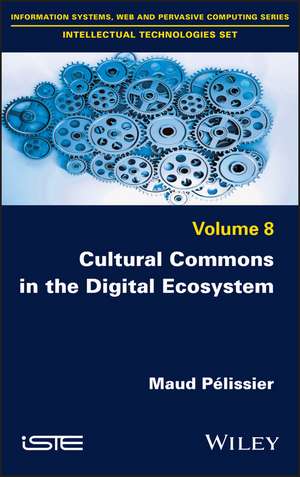Cultural Commonalities in the Digital Ecosystem
Autor M Pelissieren Limba Engleză Hardback – 2 sep 2021
Preț: 922.89 lei
Preț vechi: 1153.60 lei
-20% Nou
Puncte Express: 1384
Preț estimativ în valută:
176.62€ • 191.78$ • 148.36£
176.62€ • 191.78$ • 148.36£
Carte tipărită la comandă
Livrare economică 23 aprilie-07 mai
Preluare comenzi: 021 569.72.76
Specificații
ISBN-13: 9781786306371
ISBN-10: 1786306379
Pagini: 240
Dimensiuni: 162 x 237 x 18 mm
Greutate: 0.5 kg
Editura: ISTE Ltd.
Locul publicării:Hoboken, United States
ISBN-10: 1786306379
Pagini: 240
Dimensiuni: 162 x 237 x 18 mm
Greutate: 0.5 kg
Editura: ISTE Ltd.
Locul publicării:Hoboken, United States
Cuprins
Introduction ix
Part 1. The Intellectual Movement of the Cultural Commons 1
Introduction to Part 1 3
Chapter 1. The Pioneering Approach of Jurists from the Berkman Center for Internet and Society 7
1.1. A critique of the maximalist doctrine of intellectual property 7
1.1.1. The enclosure of the intangible commons of the mind 9
1.1.2. The threat of disappearance of free culture in cyberspace 12
1.2. The political economy of information commons 17
1.2.1. Shared ownership and individual freedom 18
1.2.2. A new mode of information production 22
1.3. The creative commons in the field of works of the mind 28
1.3.1. Incarnation of free culture practices 28
1.3.2. Institutionalization of free culture: Creative Commons licenses 31
1.3.3. The modalities of cohabitation with the commercial cultural economy 34
1.4. Propagation in the intellectual and militant sphere in France 42
1.4.1. The challenge of legalizing non-market sharing 43
1.4.2. The challenge of legal recognition of the information commons 49
1.5. Recent extensions of the BCIS approach 54
1.5.1. The digital public domain: the perimeter of cultural commons 55
1.5.2. Network infrastructure as a commons 60
1.5.3. Remuneration of volunteer contributors 63
Chapter 2. The Ostromian Approach to the Knowledge Commons 69
2.1. Ostrom's original theory of the land commons 71
2.1.1. An institutional definition of the commons 71
2.1.2. A questioning of the "tragedy of the commons" 72
2.1.3. Communal property as a bundle of rights 75
2.1.4. An institutional approach to the self-organization of common resources 78
2.2. The knowledge commons: Hess and Ostrom's approach 80
2.2.1. The singularity of information common pool resources (CPR) 80
2.2.2. Digital libraries as information CPRs 84
2.2.3. Institutional analysis and development framework (IAD) 87
2.3. Open access platforms as scientific commons? 90
2.3.1. Open access: a major transformation of the editorial ecosystem 91
2.3.2. Open access platforms: which bundles of user rights? 99
2.3.3. Enrichment and sustainability of the scientific commons 107
2.4. Cooperative platforms as social commons? 118
2.4.1. A rapprochement with the social and solidarity economy 118
2.4.2. Conditions for exploiting the social value created 122
2.4.3. Governance of cooperative platforms 126
2.4.4. Commoners' remuneration: a right to contribute 133
Part 2. The Commons in the Digital Book Ecosystem 137
Introduction to Part 2 139
Chapter 3. Digital Libraries as Heritage Commons 141
3.1. A favorable context 142
3.1.1. A new documentary order 142
3.1.2. Cultural public data as a public good 144
3.2. The production methods of heritage commons 149
3.2.1. The Google challenge 149
3.2.2. Public/private partnerships: threat or opportunity? 152
3.2.3. On-demand digitization and citizen contribution 156
3.2.4. The heritage commons: a plasticity of forms 157
3.3. Governance issue: enriching our common heritage 161
3.3.1. The construction of a shared heritage infrastructure 161
3.3.2. Content editorialization and digital mediation 164
Chapter 4. The Written Commons in the Publishing Industry 169
4.1. The transformations of the editorial ecosystem 170
4.1.1. Digital textuality and new uses 170
4.1.2. The digital book immersed in an attention economy 172
4.1.3. The digital book and the growth of self-publishing 176
4.2. Wattpad: a common narrative of the misguided written word 178
4.2.1. The use of CC licenses: a hidden reality 179
4.2.2. A progressive attraction to the attention economy 180
4.2.3. Strengthened cohabitation with publishers: the announced end of free culture 182
4.3. Self-publishing and free culture: a multifaceted face 184
4.3.1. The Lulu platform: open source for the book market? 184
4.3.2. In Libro Veritas and Framabook: free book editions 187
Conclusion 193
References 199
Index 207
